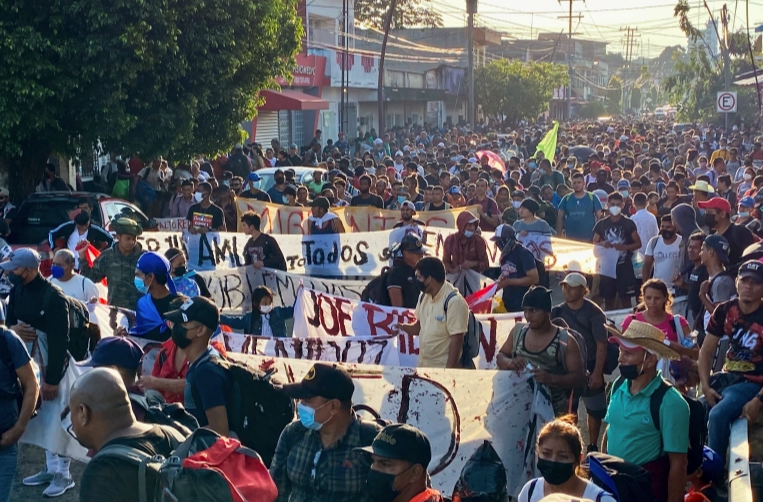
A caravan of migrants, most from Central America, head north as they depart from Tapachula, Mexico [Edgar H. Clemente/AP]
Mexico City, October 24 (RHC)-- More than 2,000 migrants and asylum seekers, mainly Central Americans, began walking out of a city in southern Mexico on Saturday where they have essentially been trapped.
The migrants walked along a highway leading west and north towards the United States border and pushed past a line of state police who were trying to stop them. There were minor scuffles and a small child suffered a slight head wound, but the migrants continued on their way.
They made it only a few miles to the nearby village of Alvaro Obregon before stopping to rest for the night at a baseball field.
Police, immigration agents and the National Guard have broken up smaller attempts at similar breakouts earlier this year.
Tens of thousands of migrants from Honduras, El Salvador and Haiti have been waiting in the southern city of Tapachula for refugee or asylum papers that might allow them to travel, but have grown tired of delays in the process.
Jose Antonio, a migrant from Honduras, said he had been waiting in Tapachula for two months for an answer on his request for some sort of visa. “They told me I had to wait because the appointments were full,” said the construction worker. “There is no work there (in Tapachula), so out of necessity I joined this group.”
He said he hopes to make it to the northern city of Monterrey to find work, adding “We’ll go on, day by day, to get as far as we can.” Unlike previous marches, the one that started on Saturday from Tapachula did not include as many Haitian migrants, thousands of whom reached the US border around Del Rio, Texas in September.
In August, National Guard troops in riot gear blocked several hundred Haitians, Cubans and Central Americans who set out walking on a highway from Tapachula.
Mexico requires migrants applying for humanitarian visas or asylum to remain in the border state of Chiapas, next to Guatemala, for their cases to be processed.
In January, a larger caravan of migrants tried to leave Honduras but was blocked from crossing Guatemala. The marches are reminiscent, but nowhere near as large, as the migrant caravans that crossed Mexico in 2018 and 2019.

